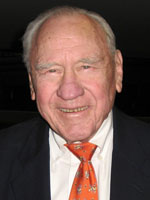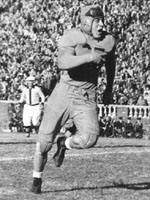 |
|
Bill Dudley |
For Virginia football fans that revere Bluefield, Virginia’s own “Bullet” Bill Dudley, many do so for his escapades and success on the gridiron. Indeed, the football accomplishments of the University of Virginia’s first consensus football All-American are numerous. What should cause Cavalier faithful to swell up with pride, though, is not the athlete Dudley was, but the man he is and has been.
Most football fans see Dudley as an example of tremendous athletic ability. While his accomplishments as a football player certainly suggest an amazing athlete, Dudley is not a tribute to great athleticism; he is a tribute to tremendous perseverance and personal integrity.
When the award named in his honor is given to the top college football player in the Commonwealth in Richmond tonight, The Sabre.com thought it fitting to look not only at the greatness that was Bullet Bill Dudley, the football player, but the greatness that is Bill Dudley, the man.
A Destiny of Providence
Throughout our lives we’ve all met individuals that we just intuitively know are destined for greatness. Whether it’s the presence or the attitude, there a sense this person is special. Early in life Bill Dudley was always told no. He was too young, too small or too slow. Dudley didn’t get the message.
“We’ll, that’s a fact,” said Dudley.
Dudley, not out of arrogance but out of sheer determination, more often than not proved his detractors wrong.
He couldn’t start elementary school at the age of six because his birthday fell in December. Dudley was once refused an opportunity to tryout for the high school football team because they didn’t have a uniform small enough for him. But he persisted and was ultimately given a shot. At 16, Dudley wanted to play college football. Virginia Tech did not offer Dudley a scholarship or a tryout because the 150-pound tailback and defensive back was considered too little for the college game. In 1942 when Dudley wanted to enlist in the Army Air Corps as a Navy pilot during World War II, he was told he was too young for the military and needed a signed release from his parents allowing him to serve.
Maybe it was luck, dogged determination or divine intervention, but Dudley obtained his objectives.
In the 1920’s Virginia law required children to be seven years of age before they could attend public school.
“I didn’t become seven until 1928 and at that time I started school in the fourth grade,” recalled Dudley who skipped grades one through three. “We had 11 grades then so I was 11 years old when I started high school and I stayed in high school an extra year so I could play an extra year of ball before I went to college.”
At 5’9″ and only 110 pounds Dudley was thought too little to play football. He eventually made the Graham High School football squad during his junior season under the tutelage of Coach Marshall Shearer where he excelled as a running back, defensive back and kicking specialist. Graham is where Dudley earned the nickname “Bullet Bill” after leading his underdog team to a victory over Princeton High with what was back then an unheard of 35-yard field goal.
In what appeared to be another setback to Dudley’s dreams of playing college football, money was tight and Dudley would only play football with the assistance of a scholarship. Colleges however were not beating down the door with offers.
Again, destiny took its course. Coach Shearer helped persuade Virginia Coach Frank Murray to recruit Dudley as an extra-point specialist.
Dudley related a story to writer Doug Doughty in a 2007 Roanoke Times article about working on a Nehi “pop truck in the summer of 1938.” Doughty writes, “… the high school coach came by and said, ‘Come on. There’s a fellow up in Tazewell at Doc Whitten’s who wants to see you.’ [UVa coach] Frank Murray was there. My high school coach told him I could kick extra points.”
“I needed a scholarship to get an education and the University of Virginia came through with one,” Dudley said in the recent Sabre interview.
He was awarded a scholarship to attend UVa and a $500 grant for his room, board and books.
“I never will forget my first year at the University, my college coach, Coach Murray, at spring practice there was some gentlemen from Richmond – Mr. Hatcher and Andy Christian – they were at spring practice,” Dudley said. “Coach Murray called me over to the sideline and introduced me to them and told me ‘Bill these are the gentlemen from the alumni chapter of the University of Virginia in Richmond that are responsible for your scholarship.’ I never forgot that.”
Originally brought on to be the team’s punter and fifth-string tailback, injuries on the depth chart and Dudley’s versatility provided an opportunity. Dudley eventually stepped into the roles of halfback and tailback as well as kicker and punter.
Time after time doors opened for Dudley that he simply walked through or kicked them down. But as Frank C. Maloney, the former President of the Bill Dudley Scholarship notes, there were plenty of providential breaks that opened doors for the boy from Bluefield.
“The doctor in that town that said ‘Let’s get him on the truck and get him up [to Tazewell], Coach Murray is going to be here’. Some Richmonders pulled together some cash to pay for his scholarship. The fact that even though he became a great running back Coach Murray signed him as a kicker,” Maloney said. “That would be like telling Herschel Walker I think Herschel would be a great scout team player for our team.”
College, Pro Career and World War II
 |
|
Bill Dudley in his playing days. |
Dudley’s college career started quietly in 1938 as he alternated between the punter and tailback positions. He saw his first extended action during his sophomore season as a back-up tailback following injuries to players ahead of him on the depth chart. Despite a losing season (4-5) as a junior, he started every game at tailback and led the South in total offense. In 1941, Coach Murray switched from the single wing offense to the T-formation and the Cavaliers, along with Dudley, thrived.
Dudley topped the nation’s major colleges with 134 points (18 TDs, 23 PATs, one field goal) and in total yards gained with 2,441, including rushing, receiving, interceptions returned, and punt and kickoff runbacks. He also completed 57 passes for 856 yards. The 134 points he scored accounted for nearly half the point production for the 8-1 Cavaliers. Dudley’s performance earned him recognition as a consensus All-American, he received the Maxwell Award and the Washington Touchdown Club’s Camp Memorial Trophy as the outstanding college football player of the year. Dudley finished fifth in the 1941 Heisman Trophy balloting.
“I scored a lot of points,” Dudley recalled, “but a lot of people forget that we only allowed something like 40-some points scored against us all year. And 21 of those points were scored by Yale in one ball game.”
One of Dudley’s fondest college memories is that of his coaches, especially his backfield coach Art Guepe and head coach Frank Murray.
“Guepe knew how to handle people and he knew the game,” Dudley stated. “Learning under Coach Murray, who as far as I’m concerned has got to be as good a coach as Guepe because he never played a game of football in his life. He had a doctorate in Philosophy and a master’s degree in English and never played a game of football. But he had a brilliant mind.”
The Pittsburgh Steelers made the Cavalier star a first-round selection in the 1942 NFL Draft. But with the nation at war, Dudley had a desire to serve his nation as an aviator flying B-25 twin-engine medium bombers. Again, roadblocks seemed to thwart his desires. Technicalities and the fact that he had not yet reached the age of 21 held up Dudley’s enlistment. So Dudley signed an NFL contract.
“They signed me for $5,000, because I was the No. 1 draft choice,” Dudley said.
Dudley ultimately was cleared to serve and was preparing for deployment when providence stepped in again.
“I was getting my flight wings in Texas and I wanted to go with a friend of mine who was getting ready to take a group to Japan. There was a bomber called Jack-the-Ripper – it was the first bomber that dropped bombs on Berlin – and a very good friend of mine was piloting that plane, a fellow named Bill Crum,” Dudley said. “I contacted him when I was about to get my wings because I knew he was coming back to the states to prepare for a return to fight the war against Japan. So I contacted him and about the time I was about to get my wings he flew into Ellington Field in Houston, Texas and he said ‘You’re not going to go overseas. You’ve gotten as far as you can get. You’re going to Randolph Field and play football.'”
Dudley’s confounded reply of “What?” was met with Crum’s equally affirmative retort of “That’s a fact.”
“You’ve got to be kidding,” was Dudley’s response.
But sure enough that’s what happened. Dudley went to the Randolph Field Training Facility in San Antonio and became a B-25 flight instructor while playing football for Randolph Field. Dudley did get shipped to the Pacific, flying one supply mission as a B-25 crewmember over Saipan.
Though he was a first round pick, some questioned Dudley’s NFL bonifides. But Bullet Bill immediately silenced the doubters again when in the inaugural game of his pro career, he ran for a 55-yard touchdown. In his second game, he scored on a kickoff return. He finished his rookie season as the league’s leading rusher with 696 yards and earned all-league honors. He spent the next two seasons in the service before returning for the final four contests of the 1945 season.
Dudley played nine seasons in the NFL from 1942 to 1953, playing three seasons each with the Steelers (1942, 1945-1946), Detroit Lions (1947-1949), and Washington Redskins (1950-1951, 1953). During that span, he recorded 8,157 yards in rushing, receptions and kick returns while scoring 484 points and intercepting 23 passes. He also was a placement and punting specialist.
In 1946, considered by some as one of the greatest single seasons by an individual player in the history of the league, Dudley scored 48 points and led the league in four different categories: rushing (604 yards, 4.1 YPC), interceptions (10 with 242 return yards), punt returns (27 with 385 return yards and a 14.0 average), and lateral passes attempted. Never before had an NFL player led the league in four distinctly different statistical categories, and it’s not likely to happen again any time soon. Obviously Dudley was named to the All-Pro squad as well as the NFL’s Most Valuable Player. Pittsburgh, coached by Jock Sutherland, tied Washington for third place with a 5-5-1 record.
In his book The Good, The Bad & The Ugly Pittsburgh Steelers, author Matt Fulks wrote:
Art Rooney called Dudley the “best all-around football player I’ve ever seen. Dudley was a Jimmy Brown on offense and a ‘Night Train’ Lane on defense.” Steve Owens of the Giants and Greasy Neale of the Eagles imposed an automatic fine on their quarterbacks if they called a pass play into Dudley’s territory.
By the end of the 1946 season, Dudley was nursing a knee injury he suffered in the season finale. Dudley and Coach Sutherland were struggling to remain on the same page so he made a decision to retire. Dudley secured a position coaching the backfield for his former position coach Art Guepe at the University of Virginia and he wrote Steeler owner Art Rooney a letter telling the Steelers he was retuning to the University. After Dudley made it clear he was not returning, Rooney reluctantly traded him to the Lions. At that point, Dudley had signed a rental agreement on an apartment in Charlottesville but when the Lions offered him a guaranteed three-year contract at $20,000 a season, Dudley decided to return to the NFL.
For a man with few regrets in life, leaving the Steelers and Mr. Rooney was one.
“Mr. Rooney was an employer who later turned into a very good friend,” Dudley said. “Rooney was a man’s man and was a man of his word and Mr. Rooney and I got along very well. I’m sorry I was not able to complete my pro career with the Steelers. I liked Pittsburgh and enjoyed being there.”
Dudley’s most impressive career statistic may be that he led his team in scoring in each of his nine NFL seasons. All this from a guy described by the Pro Football Hall of Fame as “small and slow with an unorthodox running style.”
Again quoting Matt Fulks from The Good, The Bad & The Ugly Pittsburgh Steelers
Bill Dudley was football’s anomaly. He was slow and not particularly big at 5’10” and 182 pounds. But somehow he could play on both sides of the ball. “He doesn’t seem to be able to do anything real well, but he’s a helluva football player,” said fellow Hall of Famer Sammy Baugh. “I’d say Bill was a real specialist -specializing in everything.”
Life After Football
Following his days in the NFL, Dudley embarked on a successful 50-year career in the life insurance business in Lynchburg, Va., with his brother, Jim, in 1951. He also began a successful life as a devout family man, philanthropist and politician.
From 1966-1973, Dudley served as a legislator in the Virginia House of Delegates representing Amherst and Nelson Counties and the City of Lynchburg. He was instrumental in passage of legislation raising Virginia’s minimum driving age from 14 to 16 and was active in helping Governor Mills E. Godwin Jr. enact the Commonwealth’s first sales tax to finance Virginia’s community colleges.
Dudley served as a Democrat but like Governor Godwin began to pull away from the party in the early 1970’s. He lost his bid for re-election to one of the two seats assigned to the 11th District after changing parties and running as a Republican in 1973. The two Democratic candidates won and the two GOP challengers lost.
“I got defeated after I changed to the Republican Party,” noted Dudley. “The Democratic party got too liberal for me. I’m sorry I lost the election but I’m not sorry I switched parties.”
Since 1990, Dudley has offered his voice, name and support to the Bill Dudley Scholarship Foundation, which provides financial assistance to deserving student-athletes throughout the Richmond area.
Despite all of the great accomplishments, the tremendous professional success as a businessman and the notoriety that comes with being a star athlete, what makes Dudley most proud is his wife and family. He and Libba Dudley have been married 62 years. The couple raised four children, three of which are very successful and accomplished in their own right. The Dudley’s lost one son, “little Bill” as Dudley affectionately refers to him in 1955 to leukemia.
“I think you’re lucky if you have a loving family,” proclaims Dudley. “I was raised by loving but disciplined parents and from that standpoint learned to have a respect for authority. That includes teachers, coaches, anybody in authority. It doesn’t mean you have to agree with everything either but you must respect them if they are in authority. And having a love and respect for The Almighty has been a big part of my life.”
Whatever luck or good fortune fell upon Bill Dudley, clearly his drive, competitive spirit and desire to be the best at everything he does drove his lifetime of success.
“I love the game of football and I played it to the best of my ability everywhere I went,” Dudley explained. “That’s a responsibility I take very seriously that when people hire you to do a job, you do the best you can. You’re put here to do a job and you’re supposed to do it to the best of your ability with what God gave you. I guess that means you’re supposed to live by rules of mankind and the Ten Commandants and doing what you’re told to do.”
That attitude was clearly evident to the teams Dudley played for and against. Consider this description from a 1951 Redskins game program: “Dudley is rated by rival coaches and players as one of the league’s most versatile backs. But first and foremost is his competitive spirit, the hallmark of a true champion.”
That spirit was not just evident to those with whom he competed for and against, but to the Virginia community he served for over five decades. At Bullet Bill Dudley Day in his hometown of Bluefield, Delegate Anne B. Crockett-Stark read a proclamation from the Virginia General Assembly honoring the hometown hero.
“You are a part of the greatest generation, and your service to your country during World War II will never be forgotten,” Crockett-Stark said to Dudley. “As a former member of the House of Delegates I appreciate your contributions to the community. You are a giant in all areas of your life, and the Tallest Town of Virginia is proud to have a man who has stood tall throughout his life. You are a true hero.”
On Dec. 24, the last surviving member of the NFL Hall of Fame Class of 1966 will celebrate his 88th birthday. Maloney says that even with age, Dudley has never lost the grounded, disciplined attitude taught to him by his parents.
“Bullet Bill is the most humble guy and he could easily be an old grouchy, curmudgeonly, arrogant sort of man but he’s the total opposite,” Maloney said.
Dudley sees it this way:
“I grew up in loving family, with a very disciplined mother and father, along with two brothers and a sister but I feel like I was just an average kid. I’ve always said the good Lord took a liking to me and he’s been good to us and my family. I’ve been married 62 years and the good Lord gave us a family and the opportunity to provide us with a decent living. The Almighty has had a big affect on my life and I hope he’s still around when I go to the great beyond.”
My guess, the Almighty will probably have a football team waiting for Dudley to lead.



